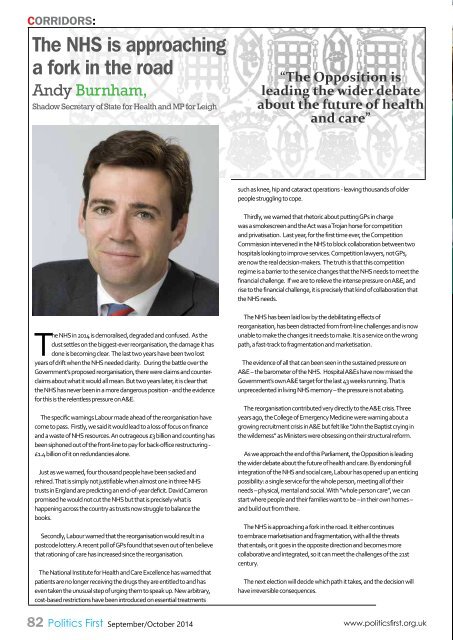Politics-First-September-2014
Politics-First-September-2014
Politics-First-September-2014
Create successful ePaper yourself
Turn your PDF publications into a flip-book with our unique Google optimized e-Paper software.
CORRIDORS:<br />
The NHS is approaching<br />
a fork in the road<br />
Andy Burnham,<br />
Shadow Secretary of State for Health and MP for Leigh<br />
“The Opposition is<br />
leading the wider debate<br />
about the future of health<br />
and care”<br />
such as knee, hip and cataract operations - leaving thousands of older<br />
people struggling to cope.<br />
The NHS in <strong>2014</strong> is demoralised, degraded and confused. As the<br />
dust settles on the biggest-ever reorganisation, the damage it has<br />
done is becoming clear. The last two years have been two lost<br />
years of drift when the NHS needed clarity. During the battle over the<br />
Government’s proposed reorganisation, there were claims and counterclaims<br />
about what it would all mean. But two years later, it is clear that<br />
the NHS has never been in a more dangerous position - and the evidence<br />
for this is the relentless pressure on A&E.<br />
The specific warnings Labour made ahead of the reorganisation have<br />
come to pass. <strong>First</strong>ly, we said it would lead to a loss of focus on finance<br />
and a waste of NHS resources. An outrageous £3 billion and counting has<br />
been siphoned out of the front-line to pay for back-office restructuring -<br />
£1.4 billion of it on redundancies alone.<br />
Just as we warned, four thousand people have been sacked and<br />
rehired. That is simply not justifiable when almost one in three NHS<br />
trusts in England are predicting an end-of-year deficit. David Cameron<br />
promised he would not cut the NHS but that is precisely what is<br />
happening across the country as trusts now struggle to balance the<br />
books.<br />
Secondly, Labour warned that the reorganisation would result in a<br />
postcode lottery. A recent poll of GPs found that seven out of ten believe<br />
that rationing of care has increased since the reorganisation.<br />
The National Institute for Health and Care Excellence has warned that<br />
patients are no longer receiving the drugs they are entitled to and has<br />
even taken the unusual step of urging them to speak up. New arbitrary,<br />
cost-based restrictions have been introduced on essential treatments<br />
82 <strong>Politics</strong> <strong>First</strong> <strong>September</strong>/October <strong>2014</strong><br />
Thirdly, we warned that rhetoric about putting GPs in charge<br />
was a smokescreen and the Act was a Trojan horse for competition<br />
and privatisation. Last year, for the first time ever, the Competition<br />
Commission intervened in the NHS to block collaboration between two<br />
hospitals looking to improve services. Competition lawyers, not GPs,<br />
are now the real decision-makers. The truth is that this competition<br />
regime is a barrier to the service changes that the NHS needs to meet the<br />
financial challenge. If we are to relieve the intense pressure on A&E, and<br />
rise to the financial challenge, it is precisely that kind of collaboration that<br />
the NHS needs.<br />
The NHS has been laid low by the debilitating effects of<br />
reorganisation, has been distracted from front-line challenges and is now<br />
unable to make the changes it needs to make. It is a service on the wrong<br />
path, a fast-track to fragmentation and marketisation.<br />
The evidence of all that can been seen in the sustained pressure on<br />
A&E – the barometer of the NHS. Hospital A&Es have now missed the<br />
Government’s own A&E target for the last 43 weeks running. That is<br />
unprecedented in living NHS memory – the pressure is not abating.<br />
The reorganisation contributed very directly to the A&E crisis. Three<br />
years ago, the College of Emergency Medicine were warning about a<br />
growing recruitment crisis in A&E but felt like “John the Baptist crying in<br />
the wilderness” as Ministers were obsessing on their structural reform.<br />
As we approach the end of this Parliament, the Opposition is leading<br />
the wider debate about the future of health and care. By endorsing full<br />
integration of the NHS and social care, Labour has opened up an enticing<br />
possibility: a single service for the whole person, meeting all of their<br />
needs – physical, mental and social. With “whole person care”, we can<br />
start where people and their families want to be – in their own homes –<br />
and build out from there.<br />
The NHS is approaching a fork in the road. It either continues<br />
to embrace marketisation and fragmentation, with all the threats<br />
that entails, or it goes in the opposite direction and becomes more<br />
collaborative and integrated, so it can meet the challenges of the 21st<br />
century.<br />
The next election will decide which path it takes, and the decision will<br />
have irreversible consequences.<br />
www.politicsfirst.org.uk<br />
“I have huge respect for our<br />
doctors and nurses…” David Cameron<br />
That’s wonderful Prime Minister, but what about all the<br />
other NHS staff?<br />
More than 1.3 million people work in the NHS and a significant majority of<br />
them are not doctors or nurses.<br />
Lazy politicians and the media insult the other professionals who work across<br />
scores of roles delivering the best patient-centred care.<br />
So, what phrase best describes the staff who TOGETHER deliver a worldleading<br />
service?<br />
Health Care Professionals<br />
#healthcarepro<br />
The Society and College of Radiographers<br />
www.sor.org


